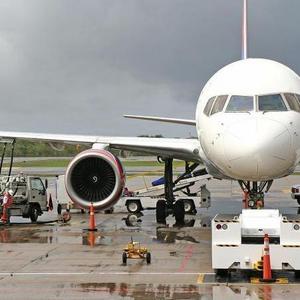Revised ASTM standard expands trace FAME limit in jet fuels

February 2, 2015
BY ASTM
A new revision to ASTM International’s Aviation Turbine Fuel Standard (ASTM D1655) safely adapts to the growing global presence of biodiesel in the petroleum industry.
ASTM D1655 has been used for decades by the aviation community to help ensure quality control and safe distribution of jet fuel. Biodiesel blends, which have a small percentage of fatty acid methyl esters (FAME), increasingly use the same distribution systems (e.g., shipping containers, pipelines, etc.) as jet fuel. After biodiesel is transported through a distribution system, there is a possibility that traces of FAME may be picked up by jet fuel, which later uses that same distribution system.
The initial response to the introduction of biodiesels into the marketplace was to maintain an undetectable level of FAME contamination in jet fuel. Due to the costs associated with that requirement and the rising presence of biofuels worldwide, industry experts studied whether the level of allowable FAME in jet fuel could be increased without compromising safety nor adversely affecting aircraft operation. As a result, the revised standard safely increases the allowable cross-contamination of FAME in jet fuel from 5.0 parts per million (ppm) to 50 ppm.
“The jet fuel specification keeps the aviation industry safe while adapting to the expanded presence of biofuels,” says ASTM member David J. Abdallah, Exxon Mobil Research and Engineering. “In fact, no discernible negative impact on jet fuel product quality was observed with up to 400 ppm of biodiesel.” Abdallah noted that a potential future revision could further increase the standard to allow 100 ppm.
Advertisement
Advertisement
ASTM D1655 was developed by ASTM Subcommittee D02.J0 on Aviation Fuels and D02.J0.01 on Jet Fuel Specifications, part of Committee D02 on Petroleum Products, Liquid Fuels and Lubricants.
The body of evidence used to support this revision included EI-JIP Report, Joint Industry Project: Seeking original equipment manufacturer (OEM) approvals for 100 mg/kg fatty acid methyl ester (FAME) in aviation turbine fuel. The study demonstrated that increasing the allowable levels of FAME in jet fuel would not compromise aircraft safety nor adversely affect aircraft operation.
Advertisement
Advertisement
Related Stories
Clean Fuels Alliance America on June 10 announced the launch of the newly redesigned BQ-9000 website, delivering a streamlined and user-friendly experience that better showcases the value of biodiesel quality assurance.
Montana Renewables LLC has delivered its first shipment of 7,000 gallons of SAF to Dearborn, Michigan's Buckeye Pipeline facility. From there, the fuel will be transported to the Detroit Metropolitan Airport via pipeline for use by Delta Air Lines.
NYC took a monumental step towards clean air and a sustainable future on Jan. 11 with the grand opening of the city's first retail fuel station dispensing renewable diesel. The project is a collaboration between Sprague and Sonomax.
The USDA on Jan. 11 awarded $19 million under the Higher Blend Infrastructure Incentive Program. The grants will support projects in 22 states to expand the availability of higher ethanol and biodiesel blends.
Jet Aviation partners with World Fuel Services to offer SAF in Bozeman, Montana, and Scottsdale, Arizona
Jet Aviation announced on Dec. 22 that it has signed an agreement with World Fuel Services to secure and offer sustainable aviation fuel (SAF) on-site at its FBOs in Bozeman, Montana, and Scottsdale, Arizona, effective immediately.
Upcoming Events










